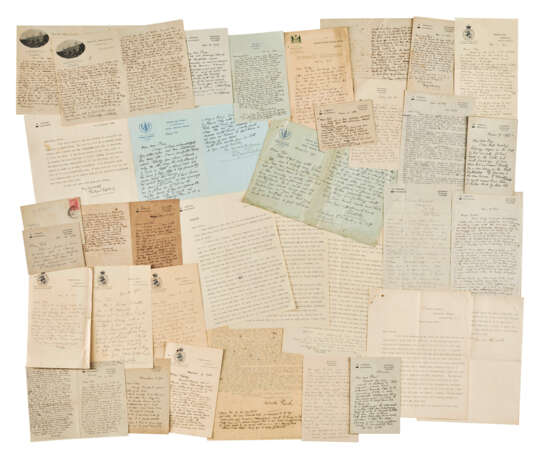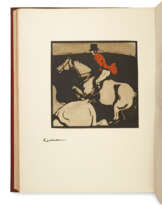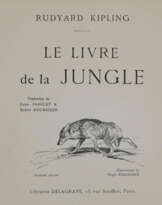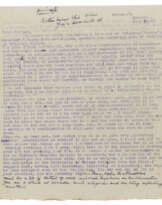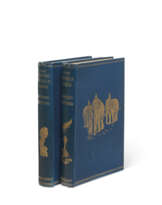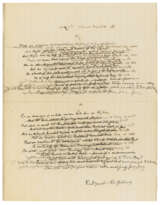ID 1108914
Lot 115 | Rudyard Kipling (1865-1936)
Valeur estimée
£ 10 000 – 15 000
23 autograph letters and cards signed and 5 typed letters signed ('Rudyard Kipling', 'Ruddy') to Edward ('Teddy' or 'Ted') Price or to Teddy's mother, Sarah (six letters), Bateman's, Brown's Hotel, London and elsewhere, 24 July 1900 - 26 December 1935
Together approximately 55 pages, various sizes, in autograph and ten pages in typescript; [with] approximately 54 autograph and typed letters by Carrie Kipling to the same recipients (two to Cormell Price); and 8 related letters. Provenance: Sotheby's London, 19 July 1990, lot 170.
An affectionate series to the widow and son of Kipling's revered headmaster at Westward Ho!, Cormell Price. The earliest letter is to Teddy as a baby, and is evidently intended for Teddy's father to read to him at a later date: 'Honoured Sir / Me having known your Par some years back and rather intimate ... and learning that you had come along and grown up ... I make bold to approach your Innocence which you will not keep long any how unless you were as nicely behaved as me ... P.S. Your Pa and me grew up together / P.P.S. Your Par done some of his growing before me but I done most of mine before him. You will find him a nice Person'. Letters from Teddy's childhood discuss his school reports, frequently invite him to stay at Bateman's during the holidays ('I've got a new car too, which is rather a beauty'), often mentioning Kipling's own son, John, and discuss the memorial at Westward Ho! for Cormell Price installed in 1913 ('It took the form of a stained glass window and a tablet and was dedicated some time in November'). Kipling discusses Teddy's choice of career ('I think you are dead right to take up field engineering') and his mother's mental illness: 'There is no doubt whatever that your mother is suffering from a severe mental breakdown which for the time at any rate, presents her from taking any part in ordinary life ... It is no more disputable than an attack of bodily illness such as typhoid for instance' (5 June 1915). On 3 March 1916 Kipling offers advice ('Don't Smoke. You'll need all the wind & stamina that you've got') and discusses arrangements for Ted to join the army. In December 1918 he encourages him to 'Stay on in the Service ... I don't think the Army has seen the last of Germany by a long way', in March 1919 suggesting that he 'keep an eye out on Mesopotamia, Egypt and the Holy Land, and try to edge out in that direction ... roughly speaking, the East is always a sound place for a young soldier'. On 10 June 1920 Kipling writes on Ted's imminent departure for India: 'the ball is at your feet but – you know to whom to write if you get a little mixed up in things'. Once Ted has arrived, Kipling's letters are full of advice and reminiscence of India: 'I don't like the idea of your playing footer in Bengal. God didn't make the climate for that purpose ... I highly approve of your falling in love. It is good for the mind and manner, the toilet and the intellect'. Kipling discusses the financial difficulties of Ted's mother, and sends congratulations on his marriage ('You've made a very good son: so the long odds are you'll make a very good husband'). The later letters include news of the house and landscape at Bateman's, holidays, health, horses, typewriters, Kipling's involvement in a film of 'some of my soldier yarns' and much else. The letters from Carrie Kipling provide further information on the same themes: a desolate letter on 21 December 1915 refers to the death of their son John at the Battle of Loos: 'I did not mention John in my letter to you because there was nothing to say. All of the evidence that we can get points to the fact of his having been killed on the afternoon of September 27th. The Guards had to fall back from the ground where John fell and we have never been able to re-occupy it, so it is impossible that there should be any proof'.
Sarah and Teddy Price were the wife and son of Cormell Price (1835-1910), Kipling's revered headmaster at the United Services College at Westward Ho! (the setting for Stalky & Co. (1899), where Price figures gloriously as 'the Head'). Price had resigned as headmaster in 1894 on a point of principle, but as Kipling noted 'He hadn't any money saved and of course he had no pension': his death in 1910 therefore left his family in a precarious position, and as the present correspondence shows the Kiplings acted as unofficial guardians to Edward Price thereafter, a relationship perhaps intensified after the death of their own son in the First World War.
| Artiste: | Rudyard Kipling (1865 - 1936) |
|---|---|
| Lieu d'origine: | Angleterre, Royaume-Uni |
| Artiste: | Rudyard Kipling (1865 - 1936) |
|---|---|
| Lieu d'origine: | Angleterre, Royaume-Uni |
| Adresse de l'enchère |
CHRISTIE'S 8 King Street, St. James's SW1Y 6QT London Royaume-Uni | |||||
|---|---|---|---|---|---|---|
| Aperçu |
| |||||
| Téléphone | +44 (0)20 7839 9060 | |||||
| Commission | see on Website | |||||
| Conditions d'utilisation | Conditions d'utilisation |
